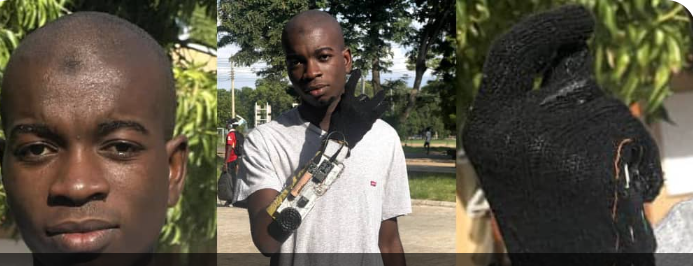
Breaking Barriers with Bare Hands: ATBU Student Stuns Nigeria with Smart Glove That Translates Sign Language to Speech

In a remarkable leap for assistive technology and a powerful message of inclusion, a student from Abubakar Tafawa Balewa University (ATBU) in Bauchi, Nigeria, has become the toast of the nation after unveiling a groundbreaking invention that could revolutionize how individuals with hearing and speech impairments communicate. Muhammad Habib Husaini, a student of Computer and Communication Engineering, has developed what he calls the NHED Smart Glove, a wearable device that translates sign language into audible speech in real time.
The device, an elegant blend of innovation, passion, and practicality, is more than just another tech gadget. It is a beacon of hope to millions who have been marginalized by their inability to speak or hear, and a poignant example of how engineering can serve humanity in the most personal and impactful ways.
The smart glove operates on a relatively simple yet highly effective mechanism. Pressure sensors embedded in the fabric detect the specific movements and gestures made by the wearer. These movements, which represent various signs in sign language, are then interpreted by an ESP32 microcontroller. The processed data is sent to an SD card module, which, through a programmed library of voice commands, produces corresponding audio output. This allows someone wearing the glove to sign normally while the glove "speaks" the intended words aloud.
What makes this innovation even more phenomenal is the fact that it was built entirely from scratch using locally sourced materials. In an era where Nigerian youth are often stereotyped or overlooked, Habib’s ingenuity not only disrupts that narrative but also brings global attention to the untapped talent brewing within the country’s universities. This is not just an academic project—it is a solution born out of empathy, personal drive, and a deep understanding of the needs of a neglected community.
Habib's motivation, as he explained, goes far beyond his academic requirements. “This glove is more than a piece of technology,” he said during a brief demonstration on campus. “With the NHED Smart Glove, we are not just building a device; we are also restoring dignity and bridging the gaps in communication.” His words echoed with sincerity, revealing a young man not only in pursuit of technological excellence but also driven by a powerful sense of social justice.
The NHED Smart Glove was designed not only for functionality but also with affordability in mind. Assistive devices capable of translating sign language typically come with high price tags, making them inaccessible to many families and individuals in Nigeria. Habib’s glove aims to break this economic barrier, offering a more inclusive future where communication is not a privilege but a right accessible to all.
Already, the innovation has generated buzz across social media platforms and in tech communities, with many expressing admiration for the young engineer’s brilliance and compassion. At ATBU, students and faculty alike are celebrating this achievement as a monumental milestone. Some have gone as far as calling it one of the university’s proudest moments in the last decade, especially given the device’s potential to transform not only individual lives but also societal attitudes toward persons with disabilities.
Though still a prototype, the NHED Smart Glove is a symbol of what is possible when education meets purpose. It represents the boundless possibilities lying dormant in Nigeria’s youth, waiting only for the right environment, encouragement, and recognition. For a country plagued with brain drain and youth unemployment, Habib’s invention is a clarion call to reinvest in local talent and prioritize research and innovation at all educational levels.
The invention also opens a new chapter in the ongoing global discourse around disability inclusion. In many parts of Africa, people with hearing or speech impairments still face enormous challenges, including limited access to education, healthcare, employment, and social interaction. Habib's glove, by translating sign language to speech, not only fosters understanding but actively erodes the communication barriers that often isolate this group from the rest of society.
In an emotionally charged reaction to the glove’s first public demo, a visiting lecturer from another institution reportedly teared up and said, “I’ve taught for over two decades and seen many final year projects, but this one right here is special. This is humanity. This is what engineering should be.”
Social media has also lit up with praise, with hashtags like #SmartGloveRevolution, #ATBUPride, and #InclusionMatters trending on X (formerly Twitter). Influencers, disability advocates, and tech innovators have begun reaching out, hoping to either support or amplify the project.
As for the young inventor himself, Muhammad Habib Husaini remains grounded. “I’m grateful for the love and support, but this is just the beginning,” he said humbly. “We need more testing, more development, and hopefully the support to mass-produce this so that the people who really need it can afford it.” He also hinted at possible future upgrades to include multi-language capabilities and Bluetooth integration for mobile pairing.
Indeed, the journey of the NHED Smart Glove is just beginning. But with a mind like Habib’s behind it, the possibilities are limitless. His story is a timely reminder that the most powerful technologies often emerge not from million-dollar labs, but from hearts committed to solving real-world problems.
In a world too often defined by division and digital distraction, this young Nigerian has created something truly unifying—a voice for the voiceless, a hand extended across the divide, a smart glove that does more than speak. It connects. It uplifts. It inspires. And perhaps most importantly, it listens to those who have spent too long being unheard.


